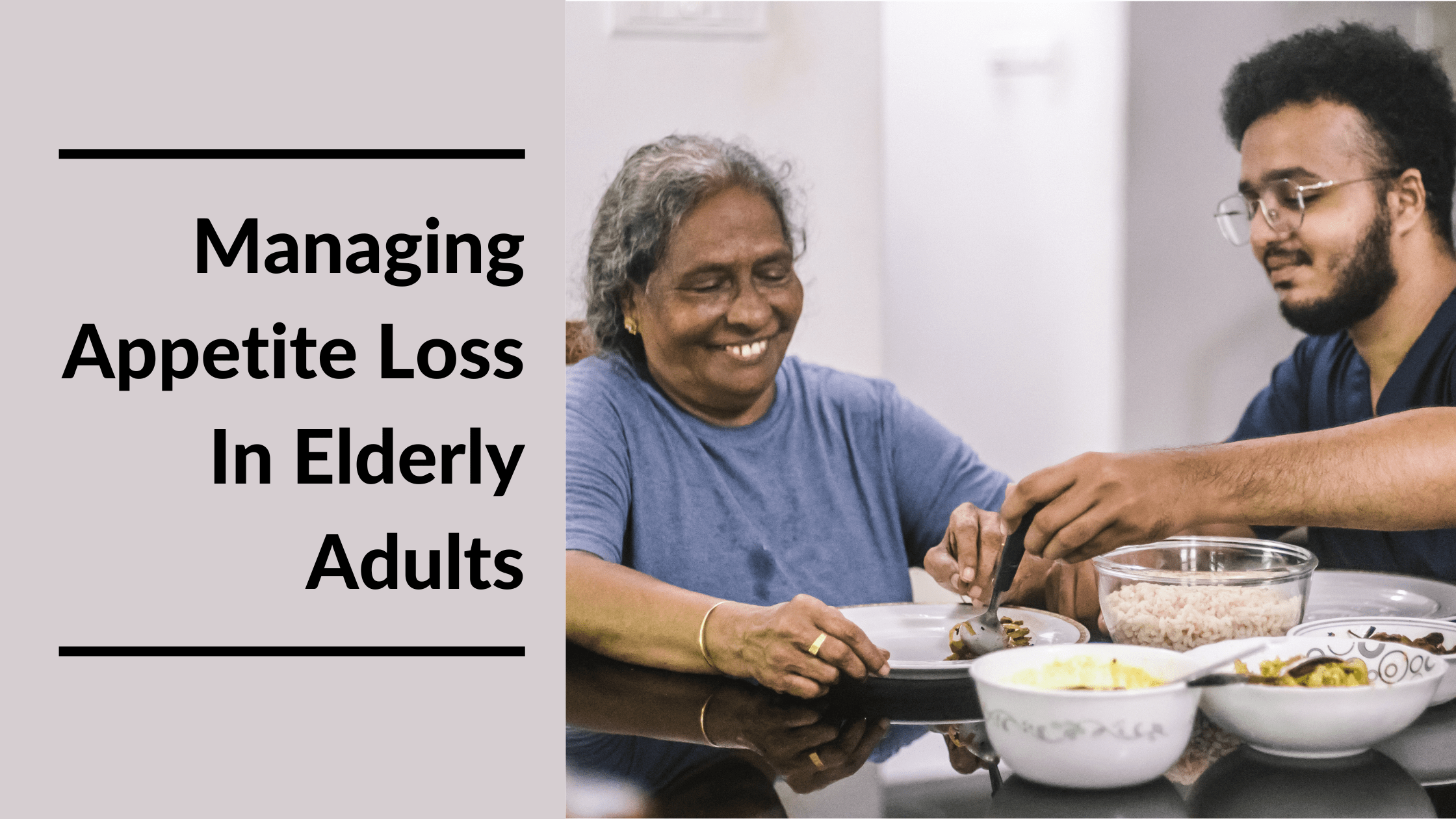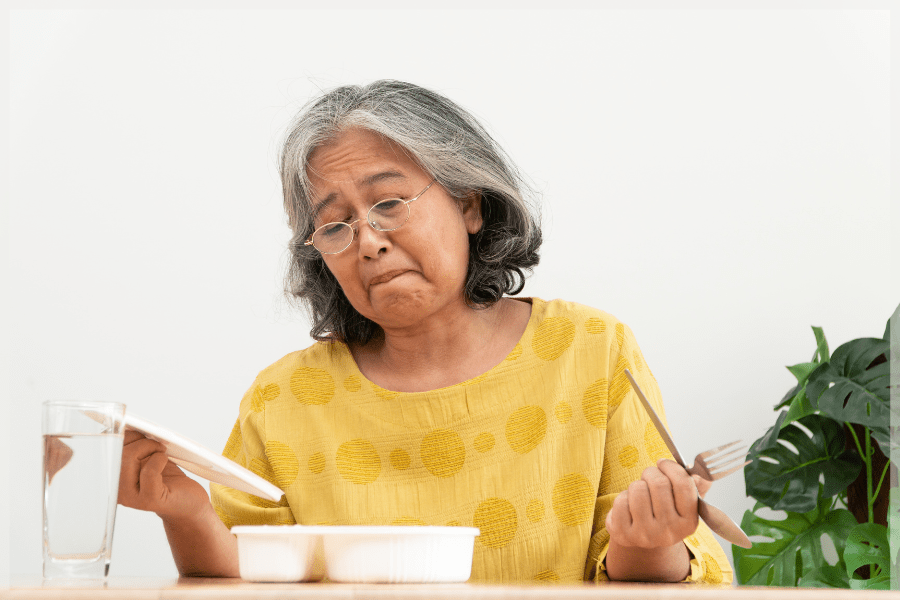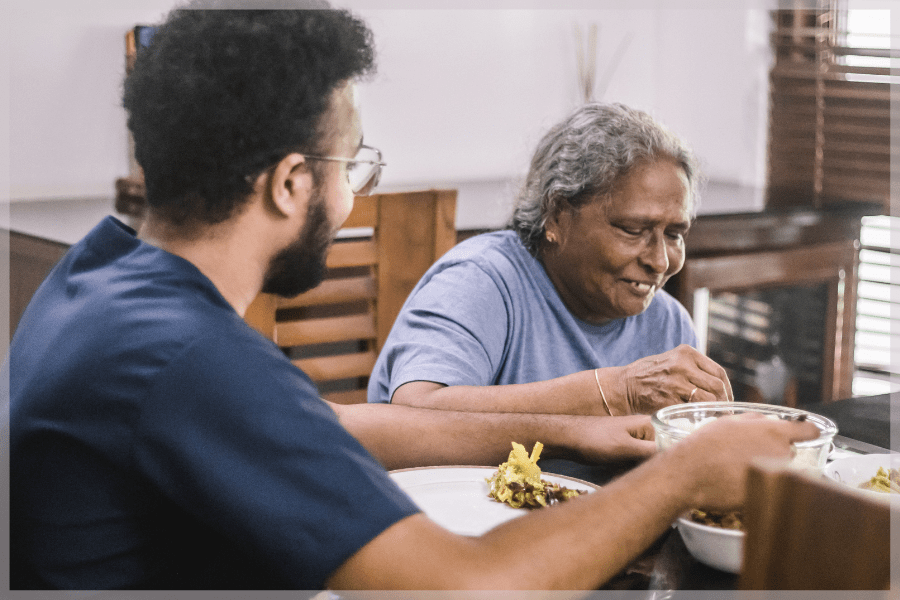
Appetite loss contributes to poor nutrition, which can impact health. Keep reading to learn how you can help manage the loss of appetite in elderly parents.
Updated October 24, 2022
What To Do About Loss of Appetite In Elderly Parents
Loss of appetite in elderly adults is one of several changes that often occur with age. In many cases, loss of appetite in elderly adults is normal and doesn’t indicate an underlying health problem. Even so, it can be concerning to see your parents start turning away meals or struggle to meet their nutritional needs.
Elderly adults must get the necessary nutrients to maintain physical, cognitive, and emotional health. Here are a few ways to help your elderly parents who are experiencing appetite loss.
What Causes Loss Of Appetite In Elderly Adults?
Appetites naturally change throughout life, but other factors can bring about a loss of appetite in elderly adults. For example:
- Older adults may not have enough energy to prepare meals.
- Their interest in food may lessen because of changing taste buds, depression, or loneliness.
- Health issues like dementia can contribute to loss of appetite in elderly adults.
- Some medication side effects make eating more difficult.
- Lower metabolism and less physical activity can lower hunger pains.
- Dental or digestive changes or issues can affect appetite and metabolism.
Although appetite loss can be a regular part of aging for some, it’s essential to reduce the harmful effects of poor nutrition.
In addition, it’s also essential to eliminate any hidden health problems or symptoms. So if your parent isn’t eating enough, the first step is to discuss their health with a doctor.

Warning Signs Of Loss Of Appetite In Elderly Adults
Older adults’ nutritional intake must match their shifting dietary requirements. Deficiencies in vitamins, minerals, and other nutrients can lead to critical health issues. A loss of appetite in elderly adults can also happen in combination with other severe illnesses, such as:
- Thyroid disorders
- Head and neck cancers
- Dysfunctional salivary gland
- Alzheimer’s, dementia, or Parkinson’s
- Periodontal disease or infections of the mouth and throat
You should involve yourself if you notice that your parent’s eating habits are less than nutritious or that they consistently aren’t eating enough. In addition, if you notice any unexplained changes in your parent’s mood or diet, schedule a doctor’s appointment to discuss possible symptoms of dementia.
How To Manage A Loss Of Appetite In Elderly Adults
If you have worries about your parent’s eating habits or nutritional health, here are tips for eating better.
Control Dry Mouth

Many medications cause dry mouth, which can lower appetite, inhibit saliva production, decrease the sense of taste, and cause swallowing problems in seniors.
One way to manage the loss of appetite in elderly adults is to offset dry mouth’s effects. A few ways to do so include:
- Chewing sugar-free gum
- Regularly brushing teeth
- Using an oral rinse before meals.
These ideas can enhance taste perception, which will improve nutrient consumption. Additionally, if your parent complains that their food tastes “off,” try other protein sources such as dairy or legumes. Similarly, if water doesn’t taste the same, you could try herbs, fruits, and vegetables like lemons and cucumbers.
Try Appetite Stimulants
Prescription appetite stimulants for elderly adults can be highly beneficial. But, of course, you should first discuss this solution for loss of appetite in elderly parents with their doctor.
Suppose you decide to try this type of medication. In that case, it’s important to let your parent and their caregiver know about any side effects and ensure it’s a suitable choice.
Keep Them Company During Meals
Eating alone can be a significant source of distress for people of any age. Loneliness can contribute to depression, which worsens appetite loss in elderly adults. But unfortunately, for many seniors (particularly the homebound or those with dementia), social contact can be challenging to access.
Consider researching meal options at senior centers, religious buildings, and community centers. Also, inviting them to meals with you, friends, and family (even meal delivery services) might improve your parent’s appetite.
Focus on Nutrition, Not Portion Size
As you work with your parent and their caregiver to improve their nutritional intake, remember that it’s better to eat smaller, nutrient-dense meals rather than larger, moderately nutritious ones.
Sometimes, people experiencing appetite loss may feel intimidated or discouraged at the thought of eating a large plate of food. Try adding avocados, olive oil, peanut butter, and similar foods to their meals. These foods are rich in healthy fats that will help your parent meet their daily caloric and nutritional intake.
Eat At Regular Times Each Day
Routine is vital for optimal body functioning, including hunger and thirst signs. When our routine changes, our appetite can, as well.
Besides eating around the same time throughout the day, try including a small drink or snack during regular mealtime. It could trigger the body’s hunger signal and boost their appetite.
Improve Sleep Hygiene
Besides changes in appetite, seniors (especially those with dementia) also undergo shifts in sleeping habits. This change can be detrimental to overall wellbeing and quality of life. Yet sleep quality in seniors is one topic that often goes overlooked.
Changes in sleep quality, duration, and more could occur due to sleep disorders like insomnia or sleep apnea. Or pain and discomfort could make it difficult to get a good night’s rest. However, if your parent doesn’t eat during the day, nighttime hunger might impede a good night’s rest.

Ultimately, these problems contribute to chronic fatigue, which contributes to depression and lower rates of physical activity – two things that also cause a loss of appetite in elderly adults.
Foods To Eat For Better Sleep
Besides eating during the day, pay attention to what your parent eats in the hours before bed. Encourage them to try these ideas for dinner and late-night snacks:
- Lean protein: Overeating protein before bed can be tricky for nighttime digestion. But a little bit in a snack can help support sleep because of plentiful amounts of tryptophan.
- Warm beverages: Decaffeinated drinks like milk or herbal tea boost melatonin production. Steer clear of sugar before bed and try to finish the last drink an hour and a half before bed to reduce trips to the bathroom.
- Healthy carbs: Combined with tryptophan-containing protein, a small number of complex carbohydrates can help turn that tryptophan into serotonin. Stick to whole wheat toast or sweet potatoes rather than cookies and white bread.
- Fruit: Some fruits have high levels of melatonin. Cherries, kiwis, bananas, and pineapples are all great melatonin sources and have lots of fiber, promoting healthy digestion and metabolism.
When eating later at night, remind your parents to eat smaller portions. Also, help them avoid eating greasy and spicy foods because these can upset digestion. Lastly, avoid alcoholic beverages because it significantly affects REM sleep.
MeetCaregivers Can Help Manage A Loss Of Appetite In Elderly Adults
Suppose your parent is struggling to maintain a healthy diet due to loss of appetite. In that case, a qualified caregiver may be able to help. An in-home care worker can help with meal planning, cooking, and ensuring your loved one meets their nutritional needs.
To get started, contact us at 1 (888) 541-1136 or Find A Caregiver today.
Check out the Blog for more resources about senior health and safety, including delicious recipes for year-round nutrition.
- American Senior Communities. (2017, May 23). Is Loss of Appetite in the Elderly a Sign of Something Else? Loss of Appetite Causes in the Elderly | ASC Blog. Retrieved December 15, 2019, from https://www.asccare.com/loss-appetite-elderly-sign-something-else/
- DailyCaring Editorial Team. (2021, June 18). 10 Reasons Why Seniors Lose Their Appetite. 10 Reasons Why Seniors Lose Their Appetite – DailyCaring. Retrieved December 15, 2019, from https://dailycaring.com/why-do-seniors-lose-their-appetites/
- Lee, K. A., Park, J.-C., & Park, Y. K. (2020). Nutrient intakes and medication use in elderly individuals with and without dry mouths. Nutrition Research and Practice, 14(2), 143–151. https://doi.org/10.4162/nrp.2020.14.2.143
